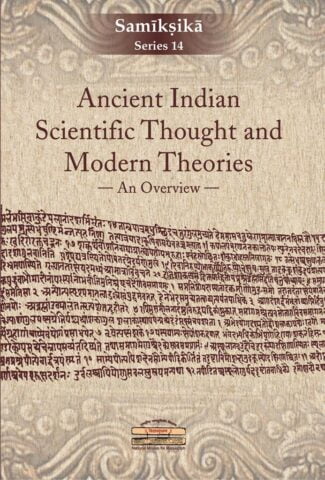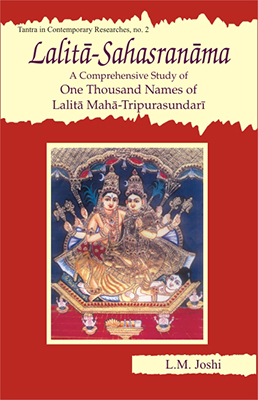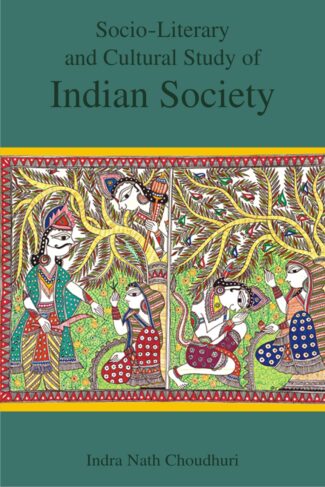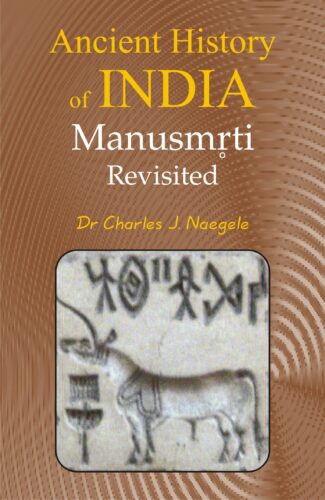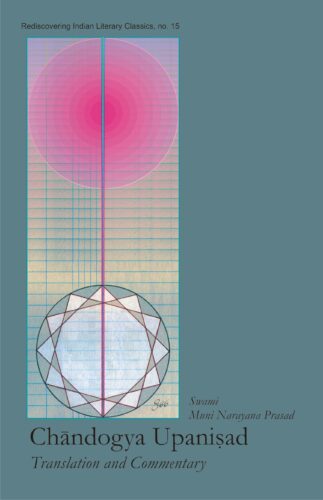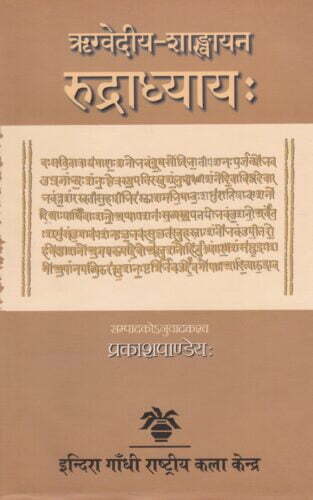

Rgvediya Samkhyayan ...
Rgvediya Samkhyayan Rudradhayay
by: Prakash PandeyThis book contains the rare Rudradhyaya of the Shankhayana Sakha of the Rigveda which has been preserved and recited by the Nagara brahamanas of Banswara district in southern Rajasthan. This edition gives an exposure to the most superior form and tradition of recitation, since till only Rudradhyaya of Shakala tradition was available in print now.
₹320.00 Original price was: ₹320.00.₹288.00Current price is: ₹288.00.
ISBN: 9788185503158
Year Of Publication: 2009
Edition: 1st
Pages : x, 102
Language : Hindi
Binding : Hardcover
Publisher: D.K. Printworld Pvt. Ltd.
Size: 23
Weight: 350
During Shiva worship, Nandi worship and other Shaiva rituals, the recitation of Rudradhyaya has been essential in both Shrauta and Smarta traditions. Any person reading and reciting traditionally a particular branch of the Vedas should also necessarily recite the particular Rudradhyaya as assigned to that particular branch.
Till today only Rudradhyaya related to the Shakala Samhita of the Rigveda was available. For the first time a Rudradhyaya from Rigveda of Shankhayana Shakha, which has been preserved and recited by the Nagara brahmanas of Baaswara district, in southern Rajasthan is being published.
This edition of Rudradhyaya is superior in many aspects than the ones available earlier as this gives an exposure to the most superior form and tradition of recitation.
- Sale!Ancient Indian Scientific Thought and Modern Theories by: Dhirendranath Banerjee, Sanjit Kumar Sadhukhan,
₹350.00Original price was: ₹350.00.₹315.00Current price is: ₹315.00.The experiences and knowledge from our past are recorded in manuscripts which have been handed down to us over several thousand years. The Government of India, through the Department of Culture, took note of the importance of this vast tangible heritage and, in order to preserve and conserve as well as to make access to this wealth easy, established the National Mission for Manuscripts (NMM). In order to disseminate the knowledge content of manuscripts, the Mission has taken up several programmes such as lectures, seminars and workshops. The Mission has published the proceedings of the above-said programmes under the following series: Samraksika (on conservation), Tattvabodha (comprising lectures based on manuscripts delivered by eminent scholars), Samiksika (research-oriented papers presented in the seminars), Krtibodha (transcribed and edited texts prepared at advanced level manuscriptology workshops conducted by NMM) and Prakasika (publication of rare, unpublished manuscripts).
Ancient Indian Scientific Thought and Modern Theories makes one revisit the development of Indian science and technology in varied fields since the Vedic period, and suggests that we have a living tradition which is vivid and dynamic, inheriting at the same time claiming freedom from the past. It is the proceedings of a three-day seminar held during 25-27 March 2017 in Kolkata, organized by the Sanskrit Sahitya Parishad, Kolkata, and sponsored by NMM. This volume bears testimony to the fact that Indian sages, philosophers and scholars had a grip on all the topics that the modern-day scientists deal with, including complicated surgery and quantum mechanics. Our Vedas, Upanisads and other literary works were the storehouse of scientific wisdom, though the prevailing socio-religious conditions impeded its widespread dissemination.
This volume is expected to invoke keen interest among all who wants to know about a scientific past that Indians inherit, be a scientist or a layman. - Sale!Lalita-Sahasranama A Comprehensive Study of One Thousand Names of Lalita Maha-Tripurasundari by: L.M. Joshi
₹1,500.00Original price was: ₹1,500.00.₹1,350.00Current price is: ₹1,350.00.In the Hindu sacred literature, Sahasra-namas: the texts embodying literally “the Thousand Names” of a deity, constitute a genre in their own right. And Lalita-Sahasranama (LS) is a veritable classic in the traditional writings of the kind — a classic widely acknowledged for its lucidity, clarity and poetic excellence. A medieval work of unknown authorship eulogising Shakti: the Mother Goddess, this Sahasranama is not just a masterly exposition of Shri Lalita’s cult, but also sets out the deity’s diverse epithets — like, for instance, Kundalini, Nirguna, Saguna, Parashakti or Brahman — which continue to evoke reverence as mantras with ‘mystic powers’. Also included among these names are the goddess’s other panegyric descriptions that have come to have profound, esoteric connotations in tantric practices — epitomizing, thus, the fundamental tenets of tantrashastra. Here is a brilliant critical edition of Lalita-Sahasranama meticulously analysing, for the first time, each of Shri Lalita’s thousand names — by a variety of themes, like the Goddess’s conceptual representations, anthropomorphic forms, disposition, abodes, kinships/consorts, ritualistic worship, and her supremacy in pantheonic hierarchy. Also explaining and interpreting anew these thousand names on the basis of time-honoured commentaries, Dr. Joshi under-scores the high importance of Lalita-Sahasranama in philosophy, tantra, yoga, sahasranama literature, and rituals of various descriptions. The book includes the original Sanskrit text of LS, its romanised transliteration and, additionally, an Appendix listing Sri Lalita’s thousand names in the A-Z sequence.
- Sale!Socio-Literary and Cultural Study of Indian Society by: Indra Nath Choudhuri
₹1,500.00Original price was: ₹1,500.00.₹1,350.00Current price is: ₹1,350.00.The Socio-Literary and Cultural Study of Indian Society from Ancient to Modern is a search for India’s heritage: Hindu, Sufi and about Nationalism and India’s freedom from her colonial past. It is analytical but not learnedness. The author believes as Iqbal, the famous Urdu poet, said: “Transcend your reason because though it is a glow, it is not your destination; it can only be the path to the destination show.” People, both Indian and foreign, who want to understand Indian heritage from Ancient to Modern in a simple, agreeable style and friendly manner, is the author’s destination. In this volume, he has tried to demolish many myths like dharma is religion, Vedas are Śruti though the Almighty ordered six ṛṣis to write them down. A Hindu is just not emotional in mind, he also believes in analytic discussion (tarka). Upaniṣads are not just created by ṛṣis but also by a revolution unfolded by the students by barraging questions after questions.By explaining about the vitality of India and many other subjects, the book elucidates many things about the idea of India in an authentic manner. The readers will find here many varieties of theological explication, ultimately leading to the celebration of life while searching for the divine and realizing the self.
- Sale!Ancient History of India by: Charles J. Naegele
₹500.00Original price was: ₹500.00.₹450.00Current price is: ₹450.00.This is a fresh look at the history of Ancient India, centering on the Law Code of Manu (Manusmriti / Manu Dharmashastra), and its relationship to Rigveda and its possible relationship to the Indus/Harappan Civilisation of 4000 to 5000 years ago. It also throws light on Aryan society and culture, castes and guilds, use of technology and related practices in the Indus Valley Civilisation.
Dr. Charles Naegele, a practicing lawyer in Silicon Valley, California, USA, and a lifelong student of classical Indian knowledge, has written a work that will be certain to stir up controversy regarding the re-dating of the Law Code of Manu and the well-documented research concerning almost no possibility of Aryan Invasion Theory and the numerous similarities between the text of the Law Code of Manu and the archeological finds from the Indus/Harappan Civilisation.
Scholars and history buffs, as well as everyone who is proud of Indian heritage will enjoy not only this work, but also his future works. - Sale!Chandogya Upanisad Translation and Commentary by: Swami Muni Narayana Prasad
₹1,350.00Original price was: ₹1,350.00.₹1,215.00Current price is: ₹1,215.00.Chandogya is the most intriguing of all the Upanishads. It begins with directing the priests of a Soma-yaga to see the hidden wisdom-significance in what they perform and recite as a brute ritual. This sublimating of ritualism gradually leads us to perceiving the entire life system as a yaj¤a held in and performed by Brahman. The next step this perception leads us to is “sarvam khalvidam brahma” (everything here indeed is Brahman). Then the enquiry as to what this Brahman is, begins. The answer we arrive at is “tat tvam asi” (That thou art). Finally we realize “atmaivedam sarvam” (atma indeed is everything here, or myself indeed is everything here). From this self-identity with “everything,” with Brahman, we never return to our identity with individuated forms pertaining to the world of becoming. The present commentary explicates in a lucid way how thinking progresses in this Upanishad, along with unravelling its schematic, structural and dialectical intricacies, both subjective and objective, both universal and particular.



